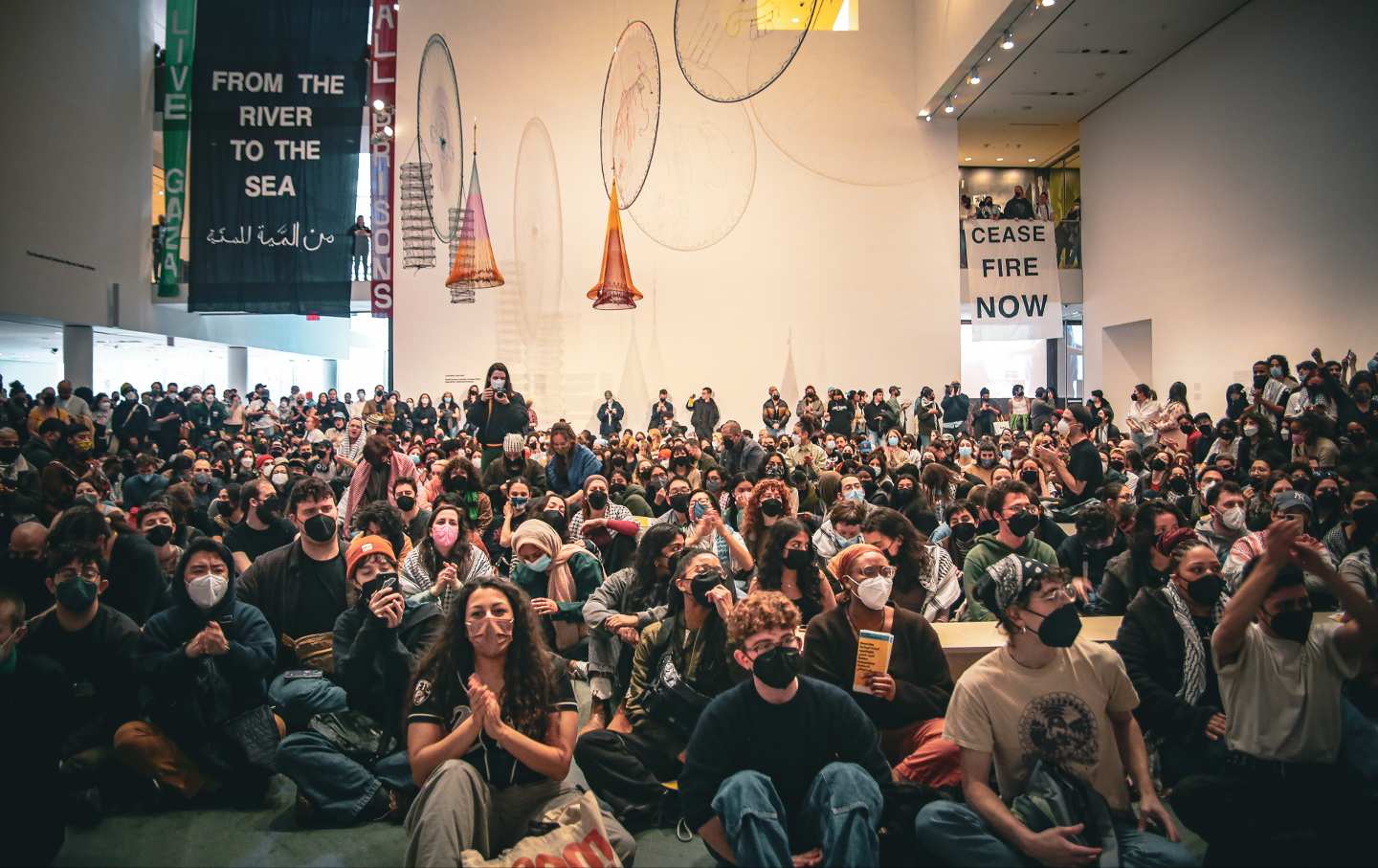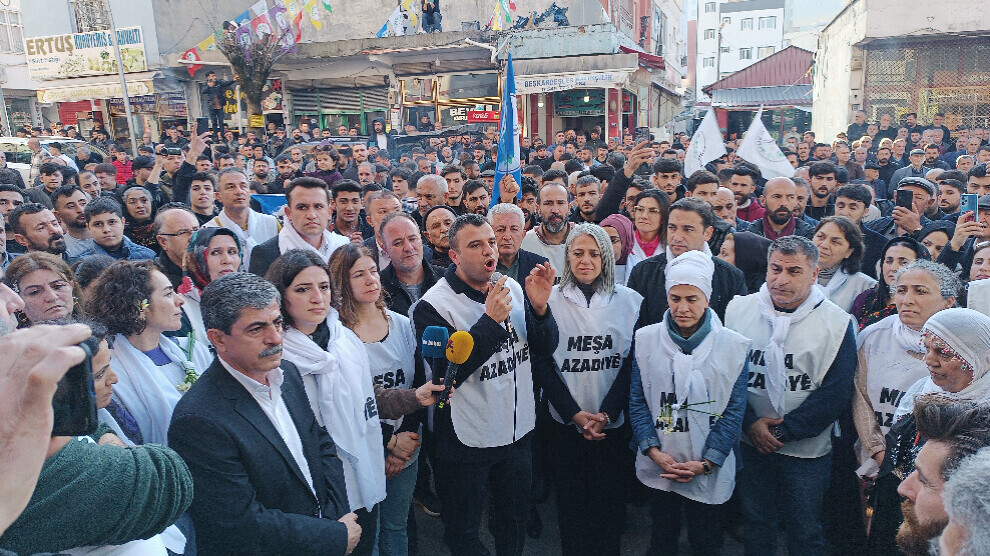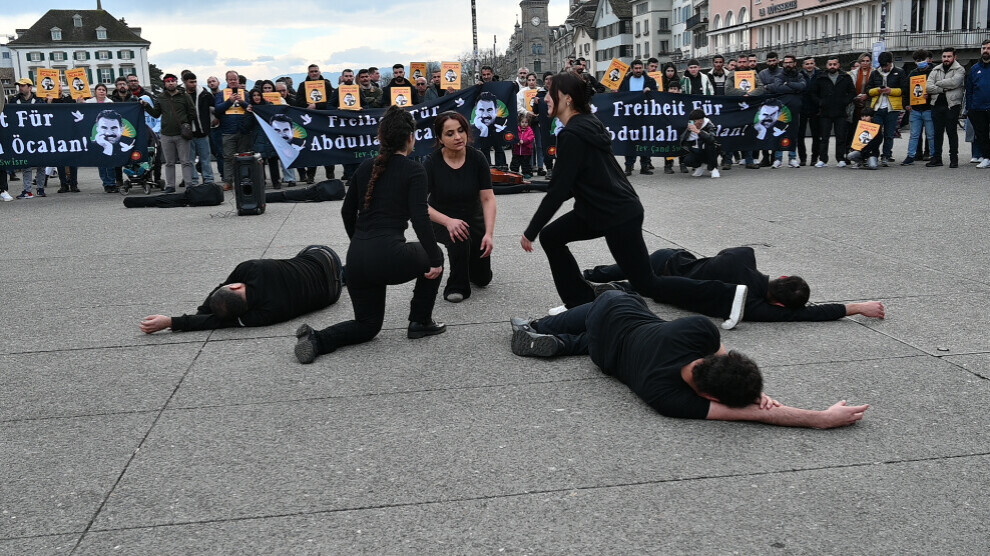








On February 14, 2024, hundreds of protesters occupied the Museum of Modern Art (MoMA) in New York City, calling for the removal of board members with ties to genocide, apartheid, and settler colonialism [99aed9d8]. The protest, organized by an autonomous collective of cultural workers and activists, aimed to disrupt business as usual and highlight MoMA's political and moral responsibilities. The protesters distributed brochures accusing MoMA trustees of funding genocide and apartheid. The action resulted in the closure of MoMA for the day. The protesters projected Palestinian art onto the museum walls, read a letter from a woman living under siege in Gaza, and accused MoMA of 'artwashing' and benefiting from war profiteering [99aed9d8].
The protest continued outside the museum, with demonstrators projecting Palestinian art on the museum's facade and marching down Sixth Avenue. The protesters called for divestment from genocide, Israel, and weapons manufacturing. The action demonstrated the power of disciplined collective action and the need for sustained pressure to achieve their demands [99aed9d8].
Over 1,200 Bristol artists are urging the Arnolfini gallery to take action following the cancellation of two events from the Palestine Film Festival in November [7bacfa6e]. While the gallery has apologized for the cancellation, an artists-led campaign affiliated with Artists for Palestine believes that the apology falls short. The campaign is calling for artists to disengage from the Arnolfini and is demanding that the gallery become a space where open debate and discussion can occur freely. The group hopes to engage in mediated discussions with the gallery's board members to address their concerns. The artists acknowledge that the campaign is directed at the Arnolfini management and not the majority of the gallery's staff. They aim to rebuild trust with the gallery through a public statement that addresses the decision to cancel and censor Palestinian voices during what they describe as a genocide. The artists emphasize the importance of freedom of expression with no exceptions when it comes to discussing Palestine [7bacfa6e].
In another part of Europe, the Kurdish Culture and Art Movement in Switzerland organized a performance in Zurich to support the international campaign for the freedom of Abdullah Öcalan and a political solution to the Kurdish question [e0b8dc6d]. The performance took place at the Rathausbrücke in Zurich and began with a minute's silence to honor those who have lost their lives in the Kurdish freedom struggle. Musician Kawa Urmiyê spoke about the abduction of Abdullah Öcalan 25 years ago and his subsequent handover to Turkey. The event included speeches, statements from Kurdish cultural movements, and various artistic performances. The campaign's next major action is a demonstration for the freedom of Abdullah Öcalan in Cologne on February 17, 2024 [e0b8dc6d].
Meanwhile, in Siirt province, Kurdistan, the Great Freedom March continues on its 11th day, demanding the physical freedom of Abdullah Öcalan and a democratic solution to the Kurdish question [cd6b3ad6]. Participants from the Kars branch of the march have reached Siirt province, where they visited the Peace Mothers. DEM Party MP Ömer Öcalan stated that the march is for the freedom of Mr. Öcalan and Kurdistan, emphasizing the need for peace and the release of Abdullah Öcalan. The march aims to raise awareness about the isolation of Abdullah Öcalan and the Kurdish question [cd6b3ad6].
Last night, the Art Gallery of Ontario became the epicenter of intense protests as pro-Palestinian demonstrators voiced their dissent against Canadian Prime Minister Justin Trudeau and visiting Italian Prime Minister Giorgia Meloni [642f9074]. The protest, sparked by the ongoing Israel-Hamas conflict, saw hundreds of demonstrators blockading the gallery's entrances, accusing Trudeau of supporting what they termed a genocide. The timing of the protest coincided with a high-profile reception, marking a significant moment in Canadian-Italian relations. Among the attendees was International Development Minister Ahmed Hussen, whose attempt to enter the gallery was blocked by protesters. The incident raises questions about the preparedness of event organizers and security personnel in managing demonstrations that directly confront political figures and their policies. The protest highlights broader societal debates over Canada's role in international conflicts and its alliances, inviting a reflection on how democratic societies address and engage with dissenting views [642f9074].
The protest at the Art Gallery of Ontario adds to the growing wave of pro-Palestinian demonstrations around the world, as people express their solidarity with the Palestinian cause and demand justice for the ongoing Israel-Hamas conflict. These protests reflect a global outcry against what many perceive as Israeli aggression and human rights violations. The demonstrations also raise questions about the role of cultural institutions and political leaders in addressing international conflicts and supporting human rights [642f9074].
Pro-Palestine activists have recently targeted a painting of Lord Balfour at Trinity College in Cambridge [c2176503]. The portrait, completed in 1914 by artist Philip Alexius de Laszlo, was defaced and slashed by a protester who sprayed red paint and used a sharp object to slice open the canvas. Lord Balfour, a Conservative prime minister and later foreign secretary, signed the Balfour Declaration in 1917, a public statement by the British government supporting the establishment of a national home for the Jewish people in Palestine. The declaration is blamed by some for launching the Israeli-Palestinian conflict. Palestine Action, the protest group responsible for the vandalism, claimed that the declaration paved the way for ethnic cleansing in Palestine and criticized Britain's continued support for the colonization of Palestine. Politicians, including Deputy Prime Minister Oliver Dowden and Lord Walney, condemned the act of vandalism and called for the perpetrators to face legal consequences. Cambridge Police are investigating the incident, but no arrests have been made at this stage. Trinity College expressed regret over the damage to the painting and informed the police. Support is available for members of the college community affected by the incident [c2176503].
In a recent development, a pro-Palestinian group claimed victory after the cancellation of Jewish musician Matisyahu's concert in Chicago [1cf6aa74]. Matisyahu announced on social media that his sold-out show at the House of Blues Chicago was canceled 'due to the threat of protests.' The U.S. Palestinian Community Network (USPCN) claimed responsibility for the cancellation, stating that their pressure campaign led to the concert being called off. This is the third concert cancellation for Matisyahu following pressure campaigns from anti-Israel activists. The cancelation of the concert was celebrated by USPCN on social media, with the group stating that 'Chicago has made it clear that it stands with Palestine and supporters of the #GazaGenocide are not welcome here! #ZionismIsRacism.' Matisyahu has accused the venues of antisemitism, while the venues claim the cancellations were due to safety concerns. The artist has pledged to continue playing shows and not give in to pressure. The House of Blues and Live Nation have not yet commented on the cancellation [1cf6aa74].
The South by Southwest (SXSW) festival is facing a similar controversy, as a group of musicians has initiated a boycott in response to the festival's decision to hold a panel discussion featuring representatives from the Israeli government [20f5d851]. The musicians are protesting against Israel's treatment of Palestinians and argue that the panel discussion normalizes and legitimizes Israeli policies. However, some musicians are concerned that the boycott could harm the careers of emerging artists who rely on the exposure and networking opportunities provided by SXSW. They argue that the festival should be a platform for dialogue and diverse viewpoints. The festival organizers have defended their decision, stating that they support freedom of speech and believe in providing a platform for different perspectives. The debate surrounding the boycott raises questions about the impact of political activism on the music industry and the responsibility of cultural events to address social and political issues [20f5d851].
In La Sarre, QC, the third edition of Alienfest, a family-friendly alternative music festival, has been cancelled after metal band Guhn Twei accused the organizers of censorship [936eb6aa]. The lead singer of Guhn Twei, Simon Turcotte, alleged that the festival rescinded their invitation to perform due to their critiques of the copper smelter in Rouyn-Noranda. The festival cited its sponsorship from steel equipment producer Métal Marquis as a 'conflict of interest.' Guhn Twei's album 'Glencorruption' criticized the mining company Glencore, which owns the smelter. The festival announced its cancellation, citing conflicts of interest between sponsors and participants. Métal Marquis denied pressuring the festival and claimed to have had no say in the programming or cancellation. Alienfest confirmed that there would be no future editions of the festival. The Horne Smelter in Rouyn-Noranda has faced scrutiny for its arsenic emissions, and Turcotte, who was diagnosed with cancer in 2016, has been vocal about denouncing the poisoning of his fellow citizens in his songs.